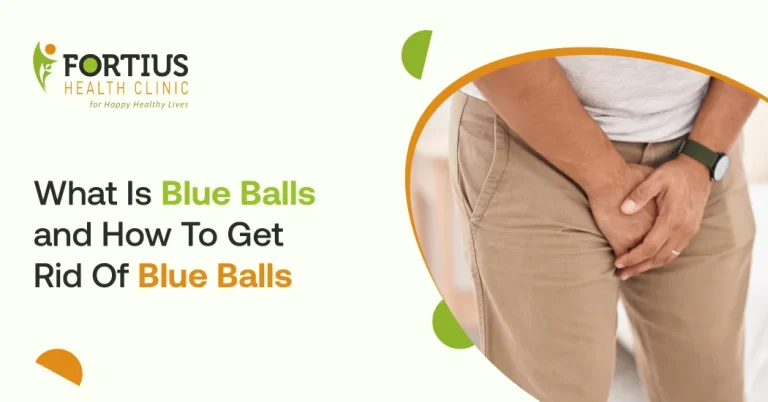
What Is Blue Balls and How To Get Rid Of Blue Balls
Blue balls occur when an erection lasts longer than the usual period of time without having an orgasm. It is not a medical condition, is not harmful to your health, and does not last long. Also, the term “Blue balls” is used to determine sexual frustration, and it does not mean that your balls turn blue. If your balls turn blue, then it is a more severe condition called testicular torsion.
Learn more about blue balls, how long does blue balls last, and how to get rid of them in this blog post.
What Is Blue Balls?
The term blue balls describes the pain or aching that occurs in the scrotum due to prolonged sexual arousal without having an orgasm. Healthcare professionals call blue balls as epididymal hypertension (EH).
Are blue balls real?
Yes, blue balls are real, and it does not mean that your balls turn blue. Blue balls is a term used for the pain, aching, heaviness and discomfort caused by the delay of orgasm and extended sexual excitement.
What Causes Blue Balls?
When you are sexually excited, sexual arousal happens. As a result, more blood flows into the male genitals and over time, this blood makes the penis to erect and expand. These bloods are released from the scrotum and penis after erection.
For someone who remains excited and aroused for a longer time than usual, the blood stays long, and that pressure causes discomfort, pain or aching.
It’s more like a pressure cooker. An orgasm is like releasing pressure and blood from the veins. However, holding the excitement for a longer time can cause the blood and pressure to stay long in the veins and epididymis, which causes aching, pain, and discomfort, which we call “Blue Balls.”
How To know If You Have Blue Balls?
Four main symptoms of blue balls occur in and around your testicles, showing you are affected by blue balls. They are,
- Aching
- Pain
- Discomfort
- A heavy feeling
If you are facing pain for a more extended period in and around the balls. Also if you are having pain in the testicles without getting sexually excited or aroused for a more extended period, then you may have other serious medical problems like stones in the kidney, Diabetic cancer and epididymitis.
How long does epididymal hypertension (Blue Balls) last?
Usually, the pain, aching, heaviness, or discomfort caused by blue balls disappear within a few minutes to hours, and for some, it may take days to return to normal. The amount of time it takes for the body to get back to non-aroused state may vary from person to person and also from situation to situation.
How To Get Rid Of Blue Balls
The best and most followed way of getting relief from blue balls is by giving time and simply waiting for the discomfort, pain, aching, or heaviness caused by the blue balls to disappear on their own. The body will naturally come to the natural non-arousal state sooner or later, depending on the situation and the person.
To relieve your sexual arousal, you are responsible for releasing the pressure caused by sexual arousal, having sex with your partner or masturbating. You listed some of the other ways that can help you to get rid of blue balls.
- Orgasm
- Distraction
- Cold Compress
- Relaxation techniques
Orgasm
The most straightforward way to avoid blue balls is getting an orgasm in the usual time and avoiding sexual excitement that exists for a more extended period. Sexual release can alleviate the built-up pressure in the epididymis and vas deferens. This can be achieved through intercourse, masturbation, or other sexual activities that result in orgasm.
Distraction
Engaging in activities that take your mind off sexual thoughts can help reduce Sexual excitement or arousal. Exercise, hobbies, reading, or social interactions can serve as effective distractions. Diverting your focus when you are having sexual excitement will allow the arousal to diminish naturally.
Cold Compress
Applying a cold compress to the testicular area can help reduce pain and discomfort. Cold temperatures cause blood vessels to constrict, decreasing blood flow to the area and reducing the sensation of pain.
Communication with a Partner
If you are in a relationship, then discussing your discomfort with your partner can lead to a mutually satisfying solution. Open communication about your sexual needs and boundaries can help manage arousal and prevent the occurrence of blue balls in the future.
Takeaway
Blue balls are not a medical condition, and they go away on their own without any medical treatments. The most common way to get rid of blue balls is to do nothing. If the pain in the scrotum lasts longer, you need to consult with a sexologist or urologist to determine the cause of the pain and get treated to avoid future problems.
FAQs
"Blue balls," medically known as epididymal hypertension, refers to the discomfort experienced in the testicles when a male becomes sexually aroused but does not achieve orgasm. This condition occurs due to increased blood flow to the genital area, leading to a feeling of heaviness or mild pain. While commonly discussed, it is not a recognized medical condition and typically resolves on its own.
Blue balls are generally not harmful and do not pose any long-term health risks. The discomfort associated with blue balls is temporary and usually subsides once sexual arousal decreases or orgasm occurs. However, if pain persists or is severe, it may indicate a different medical issue that should be evaluated by a healthcare professional.
Blue balls are not considered dangerous. They result from a temporary buildup of blood in the testicles due to prolonged sexual arousal without ejaculation. While the experience can be uncomfortable, it is not associated with any serious medical conditions. If the discomfort is accompanied by severe pain or other symptoms, medical attention may be necessary.
The onset of blue balls can occur relatively quickly, typically within a few minutes to an hour of sustained sexual arousal without orgasm. The duration of discomfort varies among individuals, with symptoms usually resolving within a few minutes to a few hours after arousal decreases or ejaculation occurs. In rare cases, discomfort may last longer.
The pain associated with blue balls varies from person to person. Some may experience only mild discomfort or a feeling of heaviness, while others might feel more significant pain. Generally, the discomfort is not severe and is often described as annoying rather than debilitating. If pain is intense or persistent, it is advisable to seek medical advice.
To relieve blue balls without ejaculation, individuals can engage in non-arousing activities to distract themselves, such as exercising or taking a cold shower. Other methods include deep breathing techniques to reduce arousal and promote relaxation. If necessary, over-the-counter pain relief medication may also help alleviate discomfort.






